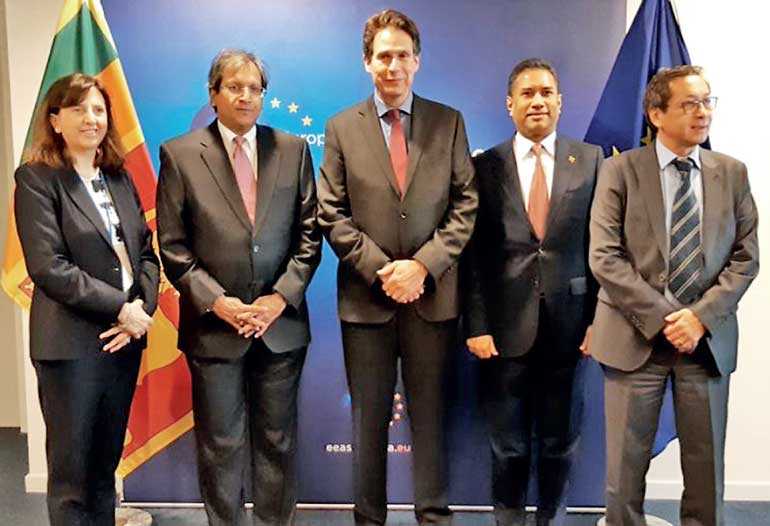Wednesday Feb 18, 2026
Wednesday Feb 18, 2026
Saturday, 16 February 2019 00:10 - - {{hitsCtrl.values.hits}}

Foreign Secretary Ravinatha Aryasinha (second from left) with Managing Director for Asia and the Pacific at the European External Action Service Gunnar Wiegand, Deputy Managing Director Paola Pampaloni, and EU Ambassador Tung-Lai Margue before the start of the 22nd EU-Sri Lanka Joint Commission in Brussels
Sri Lanka’s continued commitment to 27 international conventions, including maintaining the moratorium on the death penalty, remains crucial to retaining GSP+, the European Union (EU) has said.
Releasing a joint statement after the EU and Sri Lanka held their 22nd meeting of the Joint Commission in Brussels, the EU had reiterated its opposition to the death penalty.
“The EU also reiterated its opposition to the use of the death penalty in all circumstances and encouraged Sri Lanka to maintain its moratorium on executions with a view to abolishing the death penalty,” the statement said.
The two sides had discussed the preferential access to the EU market granted to Sri Lanka under the GSP+ scheme, which has clearly benefitted Sri Lanka since its reintroduction in May 2017, with over € 2.2 billion of exports under GSP+ during the period June 2017-May 2018. Both sides acknowledged that there was room to make even better use of the concessions granted.
“Sri Lanka reaffirmed the commitments made to implement 27 conventions on human and labour rights, environment and good governance in order to benefit from the GSP+ scheme. In this context, while acknowledging that the new draft legislation was now being considered by Parliament, the EU reiterated the need to repeal and replace the Prevention of Terrorism Act (PTA) in order to bring counterterrorism legislation in line with international standards,” the statement said.
The meeting provided an opportunity to exchange views on the implementation of the UN Human Rights Council Resolution of 1 October 2015, co-sponsored by Sri Lanka. The important steps taken by Sri Lanka with regard to establishing an Office on Missing Persons and passing legislation to set up an Office for Reparations were welcomed. Sri Lanka’s continued commitment to the implementation of the resolution was acknowledged and the EU stressed the need for further progress in the advancement of national reconciliation. The EU expressed its continued readiness to support Sri Lanka in these efforts.
The Joint Commission was informed about the proceedings of the third EU-Sri Lanka Working Group on Development Cooperation held in Brussels on 13 February. The EU and Sri Lanka committed to work jointly during 2019-2020 on the preparation of new actions aimed at fostering integrated rural development, democratic governance, investments and economic growth.
The EU and Sri Lanka discussed the EU strategy on Connecting Europe and Asia, which aims to better connect Europe and Asia through transport links, energy networks, digital networks and people-to-people connections, and agreed to deepen their contacts in this field, including in view of the Indian Ocean ministerial conference to be held in Colombo this year.
In this context, the Joint Commission noted that the European Investment Bank agrees to enhance its lending activities in Sri Lanka in the field of climate change mitigation and adaptation, particularly in support of renewable energy, energy efficiency, urban transport, and other investments which reduce CO2 emissions and/or strengthen resilience to climate change. The support extended to develop the SME sector was welcomed.
Discussions also focused on issues related to mobility and migration. Ways to enhance cooperation on higher education, with a particular reference to Horizon 2020, the EU framework program for research and innovation, were also discussed.
Ways to engage on security issues were also explored, and the EU referred to areas for deeper security engagement in and with Asia as listed in the Conclusions of the May 2018 Foreign Affairs Council, notably maritime security, cyber security, counterterrorism, hybrid threats, conflict prevention, the proliferation of chemical, biological, radiological, and nuclear weapons, and the development of regional cooperative orders.
Cooperation in the framework of the Indian Ocean Tuna Commission (IOTC) and towards the common goals of preservation of healthy oceans, conservation and sustainable use of marine living resources was discussed.
The EU and Sri Lanka agreed on a series of actions for follow-up before the next Joint Commission meeting in Colombo in 2020.